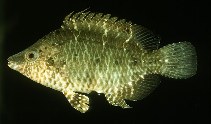| Family: |
Labridae (Wrasses), subfamily: Cheilininae |
| Max. size: |
9 cm TL (male/unsexed) |
| Environment: |
reef-associated; marine; depth range 2 - 12 m |
| Distribution: |
Western Central Pacific: Indonesia, Philippines, Solomon Islands, New Guinea and Palau. |
| Diagnosis: |
Dorsal spines (total): 9-9; Dorsal soft rays (total): 9-10. This species differs from P. cryptus by having a concave rather than straight dorsal head profile, a higher modal gill raker count, and a series of five well-defined dark brown spots on the mid lateral line (these spots may be present on some P. cryptus, but are never well-defined). Best identified by the thin white barring on dorsal fin and upper sides (Ref. 48636). SL to 57 mm. |
| Biology: |
Found in sheltered inner reefs amongst broken coral and rubble. Usually seen in less than 10 m depth, staying well hidden in reefs, but sometimes swimming amongst the long-spined Diadema urchins or in thick algae coverage (Ref. 48636). |
| IUCN Red List Status: |
Least Concern (LC); Date assessed: 25 March 2009 Ref. (130435)
|
| Threat to humans: |
harmless |
Source and more info: www.fishbase.org. For personal, classroom, and other internal use only. Not for publication.

